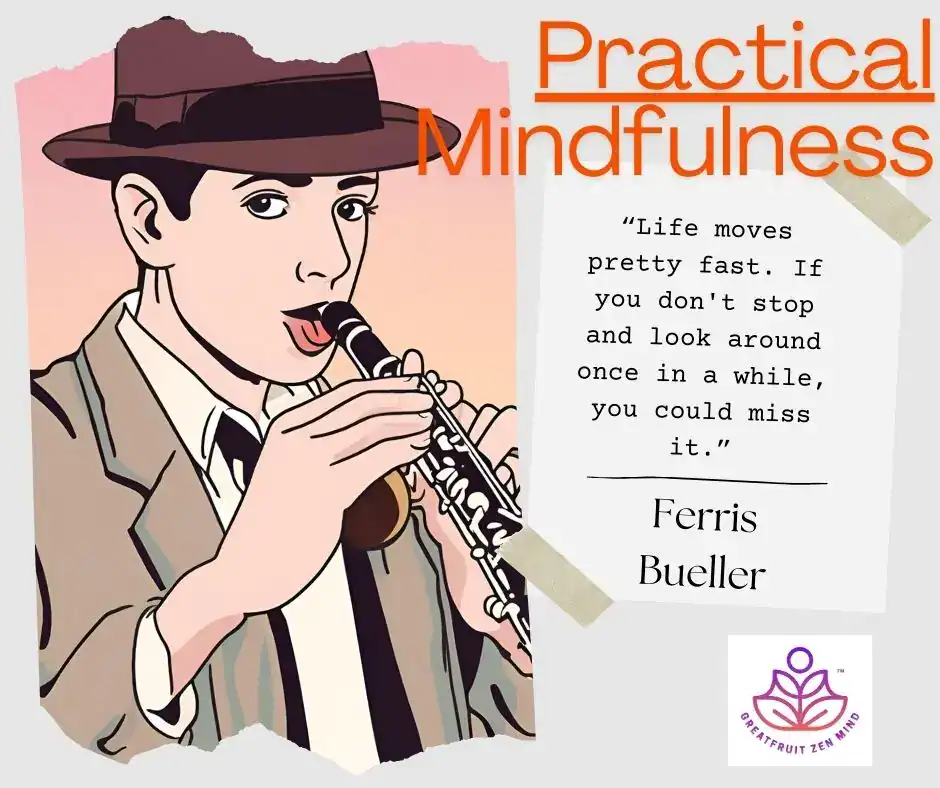Read time 4 minutes. Practical Mindfulness is a stand alone article in our Everyday Zen series.
In the last lesson I borrowed Charlotte Joko Beck’s phrase everyday Zen. I described it as daily, practical mindfulness—practical meaning seasoned, trained, skilled. The more often we weave moments of awareness into ordinary life, the more real shift we begin to notice: in how we feel, how we respond, how we interact with others.
But everyday Zen is also an art, a dance, a balancing act. Today we step further into this wide-ranging practice.
Practical mindfulness between life and philosophy
Zen thought already shows up everywhere on its own—through art, entertainment, and the familiar sayings we toss around without much thought.
When we say, I need balance in my life, or I wasn’t myself, I don’t know what came over me, we brush against Zen ideas. Ferris Bueller put it bluntly: “Life moves pretty fast. If you don’t stop and look around once in a while, you could miss it.” Was Ferris talking about the power of now long before Eckhart Tolle?
Zen is simply paying attention to what is really happening. Often, culture throws us these glimpses of truth. We recognize them. We feel them. And yet—feeling the truth of a phrase is not the same as living it. This is where practical mindfulness comes in.
Before going further, sit with these two quotes:
- Thich Nhat Hanh: “The practice of mindfulness is the practice of returning to oneself.”
- Khalil Gibran: “Your self is not something to be found. It is something to be experienced.”
We’ll return to them at the end and see if your understanding shifts.
The difference between knowledge and insight
Thich Nhat Hanh also said: “Intellectually, you may agree that things are impermanent, but you might behave as if they were permanent. We have to train ourselves to maintain the insight of impermanence in every minute of our lives.”
The key is insight. He doesn’t say “know impermanence” but “maintain the insight.” Insight is intuitive understanding—deeper than fact, beyond words.
Think of the phrase I see you. Sometimes an all-knowing glance says more than any explanation. Within it: I know your pain, your struggle, your resilience. Shared experience speaks louder than speech. Knowledge deepens into something lived.
This is the art: practical mindfulness leading us beyond knowledge into insight.
Experiential knowledge and the true self
Zen says: know your true self. But this is not intellectual knowing—it is experiential. The same with presence: you cannot force yourself to get present. You can only cultivate insight into presence and allow it to arise.
That is why training matters. Thich Nhat Hanh reminds us: “We have to train ourselves.” Everyday Zen, repeated daily, is training—seasoning the skill of awareness until it becomes reflex.
Over time, knowledge ripens into direct experience. Facts dissolve into something intuitive. We can give ourselves that inner glance, that I see you—but this time, seeing our true nature.
As Beck said: “Experiencing doesn’t mean anything fancy. It doesn’t mean more than, for just a second, being without the thought.”
An experience beyond limitation
Words will always fail here. We say we are gaining insight, but what we are really doing is remembering what was already known.
Ferris Bueller’s line is iconic because it is true: slow down, take a moment, look around. We know it, we feel it, and we yearn to live it. Everyday Zen is learning how to live it.
So let’s revisit our two quotes:
- Thich Nhat Hanh: “The practice of mindfulness is the practice of returning to oneself.”
- Khalil Gibran: “Your self is not something to be found. It is something to be experienced.”
This is practical mindfulness: a remembering through insight and experience. A return. An acknowledgment. I see you.
Explore more:
Khalil Gibran was a writer, poet, artist and philosopher who lived at the turn of the last century. Who isn’t familiar with these words? “If you love somebody, let them go, for if they return, they were always yours. If they don’t, they never were.” Or how about this for life and Zen overlapping? “Yesterday is but today’s memory, and tomorrow is today’s dream.” Ferris Bueller couldn’t have said it any better himself.
Gibran is best known for the book, The Prophet. It delves deeply into many of the concepts that we are discussing today. In particular, it reflects on the wonderful gift of the experience of life itself, despite all of its hardships. For more information and links to some of his other works, visit this biography on Poets.org.
–
Thanks for visiting Greatfruit Zen Mind.
Independent and ad-free. Help us stay that way. Add fuel or shop around.
🌀 From the GZM Archives – Polished, Preserved, Still Relevant.


Leave a Reply